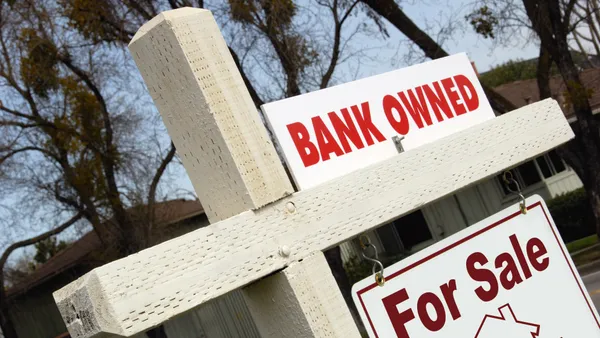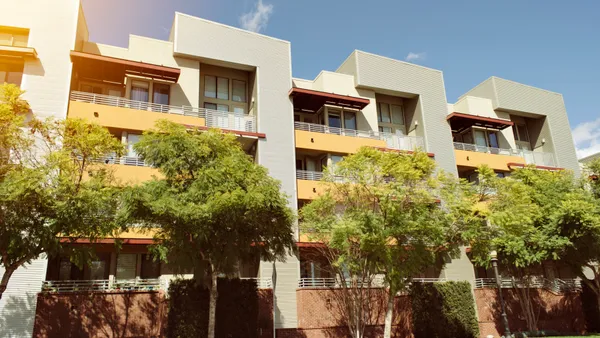Dive Brief:
- High interest rates and declining property values will constrain refinancing opportunities for the next one to two years in the commercial real estate sector, according to a new report from New York City-based S&P Global Ratings.
- S&P pointed to secular shifts weighing on rental growth and occupancy, pressuring the credit quality for rated REITs and commercial mortgage-backed securities. Elevated borrowing costs and volatile capital markets could force some buyers to use other sources of financing, such as secured debt, or they will force lenders to restructure many loans.
- Though owners throughout the commercial real estate space will face challenges, the office sector is facing the most intense pressure right now with the more permanent adoption of hybrid work dampening low office utilization. That will hit lower-quality assets especially hard, according to S&P. It expects that downgrades of issuers who have meaningful exposure to office assets will accelerate this year.
Dive Insight:
The issues facing multifamily borrowers pale in comparison to problems in the office sector. Still, many apartment borrowers with floating-rate debt are working with their lenders.
For instance, Norfolk, Virginia-based real estate investment and management firm Harbor Group International recently secured $440 million to refinance 25 multifamily properties within its portfolio. The firm secured mid-to-long range fixed rate debt with no rate variability and retained some prepayment flexibility.
Harbor’s refinance portfolios included:
- At the 915-unit Empire Portfolio in Indianapolis, Freddie Mac via Berkadia provided a $44 million loan for eight assets.
- At the 1,119-unit Florida Cardinal Portfolio, Freddie Mac via Capital One and Meridian Capital provided a $73 million loan for nine assets.
- At the 908-unit Alesio Urban Center in Dallas, Texas, KKR provided a $122 million loan for a single asset.
- In the 2,322-unit Piedmont Portfolio in the Southeast, Freddie Mac via Newmark provided a $201 million loan for seven assets.
Other borrowers with floating-rate loans are facing more dire pressures. As rates jump for some borrowers, they’ll need to sell into a market that is much weaker than two years ago.
“People are going to have to do a big cash-in and refi [after their rates go up], and it's going to force sales,” said Adam David Lynd, president and CEO of Shavano Park, Texas-based The Lynd Group.
Nitya Capital recently sold four Texas properties after reports said the Houston-based owner’s annual interest payments had jumped by $60 million since it took out $2 billion in loans on a group of properties acquired in 2021. As a result of the increased payments, Nitya was seeking to sell 40% of its portfolio, according to MarketWatch, which cited a Real Estate Alert report and research from Barclays.
Although Nitya CEO Swapnil Agarwal defended his company’s track record and the returns on his sales in an interview with Multifamily Dive, he did acknowledge 2023 isn’t the best time to put properties on the market.
“Of course, I would love to monetize in a great market like 2021, but the reality isn’t 2021 anymore,” Agarwal said. “Given the circumstances and the market, I feel we did really, really well in those sales.”
But, in some cases, commercial real estate owners may not have the option to refinance or sell. “We expect more cases of borrowers handing back keys to lenders for properties that are underwater,” according to S&P.
Click here to sign up to receive multifamily and apartment news like this article in your inbox every weekday.











